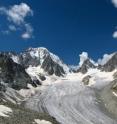Glacial melting may release pollutants in the environment
Those pristine-looking Alpine glaciers now melting as global warming sets in may explain the mysterious increase in persistent organic pollutants in sediment from certain lakes since the 1990s, despite decreased use of those compounds in pesticides, electric equipment, paints and other products. That's the conclusion of a new study, scheduled for the Nov. 1 issue of ACS' Environmental Science & Technology, a semi-monthly journal. In the study, Christian Bogdal and colleagues focused on organic pollutants in sediment from a model body of water –– glacier-fed Lake Oberaar in the Bernese Alps, Switzerland –– testing for the persistent organic pollutants, including dioxins, PCBs, organochlorine pesticides and synthetic musk fragrances. They found that while contamination decreased to low levels in the 1980s and 1990s due to tougher regulations and improvements in products, since the late 1990s flow of all of these pollutants into the lake has increased sharply. Currently, the flow of organochlorines into the lake is similar to or even higher than in the 1960s and 1970s, the report states.
The study attributed the most recent spike in the flow of pollutants into Lake Oberaar to the accelerated release of organic chemicals from melting Alpine glaciers, where contaminants were deposited earlier and preserved over decades. "Considering ongoing global warming and accelerated massive glacial melting predicted for the future, our study indicates the potential for environmental impacts due to pollutants delivered into pristine mountainous areas," Bogdal said.
Source: American Chemical Society
Other sources
- Melting glaciers may be pollution sourcesfrom UPIThu, 22 Oct 2009, 19:49:17 UTC
- Melting Glaciers Cause Mysterious Increase in Pollutionfrom Live ScienceWed, 21 Oct 2009, 16:14:08 UTC
- Glacial Melting May Release Pollutants Into The Environmentfrom Science DailyWed, 21 Oct 2009, 15:21:44 UTC
- Glacial melting may release pollutants in the environmentfrom PhysorgWed, 21 Oct 2009, 14:14:34 UTC
